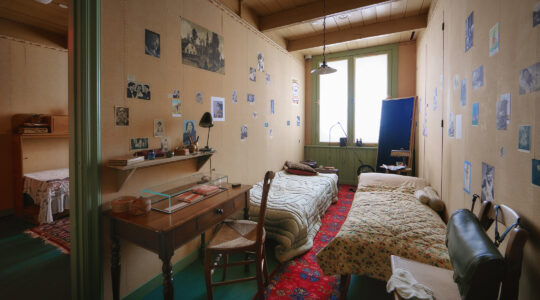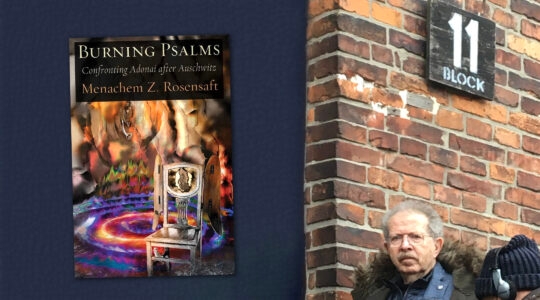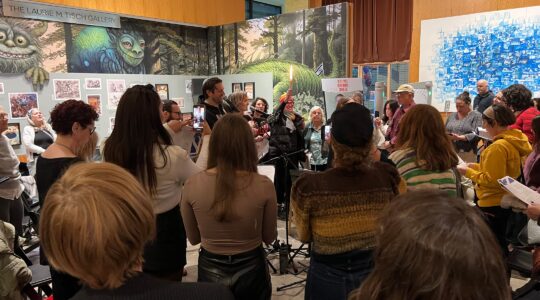Her father fled Nazi Germany before World War II, arriving in New York as a refugee; her grandparents and an aunt were murdered at Auschwitz; and another aunt, now 92, somehow survived two years of hiding in Berlin.
His grandfather built a life in India as a renowned Islamic and Persian scholar, a teacher and an imam at the local mosque, and his Muslim family continues to live in South Asia.
With two such markedly different backgrounds, the chances of Helene Lauffer and Muzaffar Chishti meeting, much less falling in love, could be seen as remote by many observers.
Large numbers of Jews and Muslims eye each other with suspicion over events in the Mideast, creating fear, mistrust and even hostility between the two groups locally and around the world. But Lauffer, 52, and Chishti, 59, not only married 16 years ago, but are now raising two young daughters who consider themselves both Jewish and Muslim.
The Upper West Side family belongs to Manhattan’s City Congregation for Humanistic Judaism, where both daughters, 8-year-old Hava and 12-year-old Maryam, attend the Sunday-morning children’s school. It’s there, in fact, where Maryam is preparing for her bat mitzvah, a ceremony in which she, like other kids, will explore her family history and values, as well as her identity.
|
Read more in Doug Chandler’s series Difficult Dialogue: Jews and Muslims Overcoming Hurdles: |
“Maryam’s hope, and our hope, is for her to examine both sides of her background and to synthesize them” into something that feels comfortable for her, said Lauffer. She and her husband, she added, hope to familiarize both children with the tenets of both faiths, allowing them, as adults, “to connect with either community as much or as little as they want.”
While surveys for years have pointed to a rising rate of interfaith marriage among American Jews, it’s safe to say that Jewish-Muslim relationships are rare, said Rabbi Kerry Olitzky, executive director of the Jewish Outreach Institute. But that may be changing as Jews and other groups of Americans, including Hindus and Buddhists, interact more and more in the workplace, schools and other public settings, said the rabbi, whose institute advocates for a more inclusive Jewish community.
Perhaps the best-known Jewish-Muslim couple, at least locally, is U.S. Rep. Anthony Weiner, a Jewish Democrat, and Huma Abedin, a Muslim raised in Saudi Arabia and a personal assistant to Hillary Clinton. Weiner, 45, and Abedin, 34, are reportedly marrying this weekend.
The Chishti-Lauffer family came to the attention of many New Yorkers last month when Muzaffar Chishti read a statement prepared by Maryam at a raucous community board hearing in Lower Manhattan. The hearing, held to consider the public’s views on a proposed Islamic community center near Ground Zero, drew both advocates and opponents of the plan. But Maryam, noting her mixed background, left no doubt about her own position.
“I have always had a place to go in the city to learn about Jewish history, culture and traditions,” Maryam’s statement said. “But I don’t have a similar place to go to learn about what it means to be Muslim” — a community center that would welcome “people of all different religions and backgrounds.”
A few weeks later, Maryam and her parents welcomed a visitor to their spacious, book-lined apartment to discuss their experiences as a Jewish-Muslim family. Open and forthcoming, they touched on a variety of subjects, including the family’s decision to give their daughters grounding in both faiths — a choice with which others may disagree, Lauffer acknowledged.
Chishti and Lauffer met about 25 years ago through their volunteer work on various nonprofit boards, the two said. Chishti, a native of India’s Kashmir province, had come to the United States in 1973 to study law and, by that point, had become an attorney specializing in migration law, a field in which he still works. Lauffer, raised in a Reform Jewish household in Manhattan, had begun her career as an executive in the nonprofit world.
“I ended up at a lot of meetings with him,” Lauffer recalled, “and I always found his intellect very attractive and compelling.” The admiration was mutual, and the two dated for several years before getting married in October 1994.
That decision encountered not a shred of hostility from their families, contrary to the experience of many interfaith couples, Chishti and Lauffer said.
Chishti’s parents, who are still alive and living in India, “weren’t particularly surprised” that he would date or marry a Jewish woman, especially in a city as diverse as New York. “I think they were more concerned about what type of person she was,” he said.
Placing that history in context, Chishti said India was free of anti-Semitism and that many Muslims, including his own family, appreciate Judaism as one of the great monotheistic faiths.
“We grew up knowing we were cousins,” he added.
For her part, Lauffer feared that if anyone in her family may have had misgivings, it would have been her father’s one surviving sister, now living in Wisconsin. But her aunt “embraced” the marriage and now has a close relationship with her nieces. Lauffer’s parents died before she met Chishti.
Lauffer acknowledged that she and Chishti differed with each other early in their relationship “not only over religion, but over nationality. But at the end of the day,” she added, “our values were very similar.” Those values include an appreciation for family, friends and education, as well as honesty, integrity and a shared belief in tikkun olam, or repairing the world.
One of the few decisions that required some negotiation at first concerned how to name their future children, according to both parents.
“Muzaffar said it was important to follow Muslim tradition and give our kids Arabic names,” Lauffer recalled. “And I said, ‘That’s fine, as long as we follow Jewish tradition and name our children after a relative who’s no longer alive.’”
The names they eventually chose both reflect that compromise, with Maryam named for Lauffer’s mother, Myra, and Hava named for Lauffer’s father, Heinz.
In their 16 years of marriage, Chishti and Lauffer have formed close friendships with a diverse array of New Yorkers, including many people they invited last year to a joint celebration of Rosh HaShanah and Eid al-Fitr, a Muslim holiday marking the end of Ramadan.
They also agree on politics, a subject that Rabbi Olitzky identified as the single area that could cause the most difficulty for a Jewish-Muslim couple. Chishti said he’s the “only member” of the Chishti-Lauffer family to have visited Israel, as part of a trip more than 10 years ago to help the country improve the integration of new immigrants, and that he subscribes to what’s become the consensus view — the need for a two-state solution.
As for their children’s views, Maryam “is becoming more and more interested in current events,” Lauffer said, laughing. “But, at this point, I think she’s more interested in the release of the third ‘Twilight’ movie.”
But the couple’s one move that others might question involves their effort to provide Hava and Maryam with a dual, Jewish-Muslim identity.
The Reform movement, for instance, recommends that interfaith families raise their kids in only one religion, while respecting the other, said Vicky Farhi, the lead outreach specialist at the Union for Reform Judaism. “We feel it gives significant clarity to the child,” as opposed to giving them “a little bit of this and a little bit of that.”
A local Muslim leader, Imam Khalid Latif of New York University, agreed that it could be hard “for a 5-year-old to go to Sunday school and a mosque.” But Hussein Rashid, an American-born Muslim who teaches religion at Hofstra University, said he couldn’t make a “blanket statement” on the subject.
“Depending on how the parents managed it, it could be an enriching experience,” he said.
Those views aside, Maryam comes across as a bright, self-possessed child, comfortable with what she’s learned about both religions. She recently interviewed her 92-year-old aunt about the Holocaust for a class at Manhattan’s Gateway Middle School and is now talking to relatives from both sides of her family for her bat mitzvah project.
“What’s beautiful is that this family found a place where they could feel comfortable,” said Rabbi Peter Schweitzer of the City Congregation, a Jewish community that emphasizes cultural values.
“Helene could have joined alone,” he added, “but Muzaffar felt comfortable enough as a progressive Muslim” to join the congregation, too.
The New York Jewish Week brings you the stories behind the headlines, keeping you connected to Jewish life in New York. Help sustain the reporting you trust by donating today.




